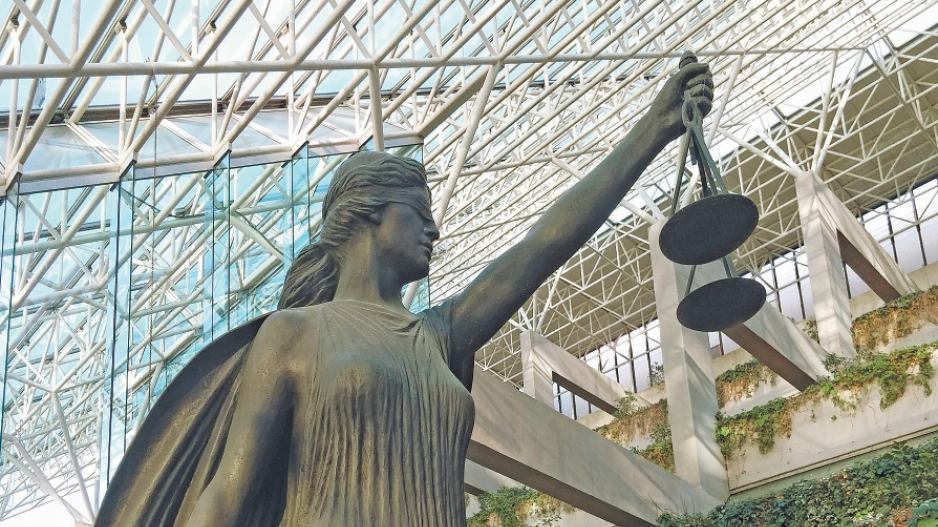The witness testimony section of the Meng Wanzhou extradition hearings continued Monday, with defence lawyer Richard Peck cross-examining RCMP officer Ross Lundie on his role of assisting the FBI on the coordination of Meng’s arrest in 2018.
Lundie, the police officer posted at Vancouver International Airport at that time, said he has had contact with various law enforcement agencies throughout his career – and may have answered questions from the FBI on the Meng case’s operations.
However, the officer emphasized that such contact was coincidental – that his main role was to serve the RCMP and assist in the operations of the police’s central financial crimes unit.
“My function is to serve the RCMP,” Lundie said in court, pushing back on Peck’s assertion that the officer worked a dual role of assisting the police an acting as a liaison to the FBI on the case. “I wouldn’t call it a dual role... Could I have answered some questions? Yes. But I work for the RCMP.”
Peck, however, pointed to a number of emails sent by the RCMP financial crimes unit indicating that Lundie was the key contact for the FBI.
“I didn’t imply that you asked for the role,” Peck said. “But you were identified by another officer as being good for the role. You’ve had experience contacting the various law enforcement agencies... You are familiar with CBSA [Canada Border Services Agency] processes.”
“My role is to assist,” Lundie replied. “If you call me, I will assist... It should have been the [financial crimes unit] keeping contact with agencies like the FBI.”
“But you did it!” Peck fired back. “... You took it upon yourself to make sure – quote – ‘things went smoothly.’ Someone did ask you to be a point of contact. For the FBI.”
Peck further accused the RCMP sergeant of trying to cover up his role in having contact with the FBI throughout the case, noting the lack of the mentioning of the U.S. investigative agency in any of his written notes or legal Will Say.
“Is there anything that concerned you about being the FBI point of contact?” Peck said.
“At the end of the day, I was identified as a contact in the case, and she [the local FBI legal attache] contacted me for updates,” Lundie said. “I didn’t pass along any information that I shouldn’t have.”
“Do you have anything about that [communication channel] that you want to tell us about?” Peck questioned.
“No,” Lundie replied.
Peck also – as he and the defence team did with every witness so far – attack Lundie’s lack of useful notes in the arrest process, to which the RCMP officer responded by admitting he should take better notes.
“Were you trying to downplay your role in the arrest in your emails to [Crown attorney John] Gibb-Carsely?” Peck said, referring to Lundie’s statement provided to the Crown lawyer in the Meng case.
“No,” Lundie said, adding he was not the officer leading the operation despite him having a higher rank than either RCMP officers serving the warrant to Meng on Dec. 1, 2018. “I offered someone to translate in the case, and I answered some questions while providing suggestions.”
Lundie also reiterated that the RCMP had no interest in Meng other than two facts: Serving the arrest warrant and securing her electronic devices, per the extradition request. When Peck asked if it bothered Lundie that the phones would be used to assist the FBI’s case against Meng, the RCMP officer maintained that Canadian authorities had no plans to investigate the phones in any way.
That, Lundie said, was why he was surprised when he found out months later that the RCMP obtained Meng’s passcodes for her electronic devices – an occurence that the CBSA has attributed to an operational error in passing over the information obtained during the border entry examination.
“I was telling our officer exactly that – to make sure we don’t ask for anything from the CBSA,” Lundie said. “We have proper channels for that.”
“Did you know about these passwords?” Peck responded. “Did you instruct someone [to get it]?”
“Absolutely not,” Lundie said.
Much of the attention on the case over the weekend centred around a Wall Street Journal report that U.S. authorities and the lawyers of Meng – CFO of Chinese telecom giant Huawei Technologies Co. Ltd. - are discussing a plea deal that would allow the tech executive to return to China in exchange for admitting guilt in fraud and money laundering charges.
There were no indication from the court hearings Monday that there may be movement on that front, as no mentions were made by Crown counsel that the requesting state (the United States) may rescind its extradition request.
The hearings continue tomorrow.




